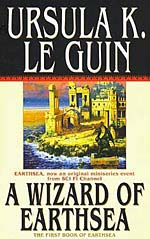
![]() everythinginstatic
everythinginstatic
5/12/2013
![]()
See, when someone recommends me a book, I am usually much more inclined to read it, because I like to listen to other people (especially when they used to live with me and knew about my interests in fantasy) and also because an endorsement must be worth something, right? So I dove right in to the Earthsea Quartet, thinking it would be great and amazing and earth-shattering. I'll review each book individually, because that really makes more sense, and my opinions vary (hence the middle-of-the-road rating of 3 stars).
A Wizard of Earthsea
This reads so much like Harry Potter, and yet not. The story follows Ged, a goatherd with extraordinary power, his time with the mage Ogion, his time at the wizard school on Roke and his struggles to understand and master his power. In certain respects, it is like Harry, because you have boy of great power learning how to use and harness his magic. The language, character building, lore and world are a lot more complex, especially with Earthsea being a totally fictional place.
I enjoyed this one, although it does lag for a bit in the middle. Not terrible, but not as amazing as it was touted to be. 3/5
The Tombs of Atuan
Holy crap. This is good. Scary good. The world-building, the characters, the pacing, the religious aspects, everything about it is just mindblowing. I loved Tenar/Arha as a character, she is resourceful, clever and curious, but also loyal and to a certain extent just. She genuinely believes in her role as Priestess of the Tombs (for a small time, albeit) and it's interesting to see the discussions on religion that Le Guin peppers throughout the novels.
The Nameless Ones, harkening to both the power that Ged unleashes in A Wizard of Earthsea and the Elder Ones of Lovecraftian horror, are never shown in full, but they are there. The darkness and claustrophobia of the tombs themselves is beautifully penned, and one really feels the sun on their face when Tenar finally escapes their confines. By far my favourite of the whole quarter. 5/5
The Farthest Shore
This one moves the focus back to Ged, now the Archmage of Roke. There is a power in the world that is upsetting the equilibrium. A hole that sucks out magic, love and good out of the world, in exchange for some sort of immortality. Arren, the prince of Enlad, and Ged embark on a perilous journey to find this hole and stop at nothing to redress the balance. There is a lot of philosophical discussion in this one, and also the sense of an ending for Ged. Immortality is not the boon it seems to be, and a lot of hard choices have to be made.
Too bad Arren is such a whiny little shit. I seriously couldn't give a fuck about this kid, and I sorely missed being in Ged's head instead. The whole book was absolutely ruined, because I couldn't go more than 20 pages without him whining about something like a spoiled brat. He was about a sympathetic as a wet rag, and it destroyed the book for me. His big character change at the end is so out of left-field it's ridiculous. 2/5
Tehanu
Tehanu sees the return of Tenar, now a widow with two grown children, who takes in a child who has been sexually abused and almost burned to death, Therru. This is a markedly more mature book than the previous three, with themes like child sexual abuse, rape and violence a lot more prominent than in the first three. I'm really ambivalent on this one. On the one hand it's back to Tenar, my favourite character in the series; on the other hand, it's a lot more pastoral and slower in pacing than any of the previous books. Ged makes a reappearance, though he plays a much more minor role.
Ultimately, this is supposed to be the start of the a new series set on Earthsea, and continued in The Other Wind, but I'm a bit burned out on Earthsea. The last 30 pages are where things really come together, and it's clear Le Guin understands topics like PTSD, rape and assault but I'm not entirely sure that the departure/transition is as smooth as intended. It felt jarring at times, and had I known about the marked difference in content, I probably would have stopped 3 books in. 3/5
Would I recommend it? Only for the first two, to set the stage for *The Tombs of Atuan*, one of the best female-driven (for about 75% of it, once Ged appears he is the clear catalyst for the changes that Tenar undergoes) fantasy books I've read in a long time. The other two? Forgettable and completely skippable, in my opinion.